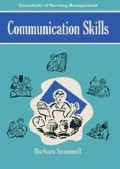Abstract
There are three aspects of ‘advice giving’ for which the nurse manager is responsible in his or her day-to-day work:
-
(1)
Teaching/coaching staff.
-
(2)
Educating staff and the public.
-
(3)
Informing staff, peers, patients, clients and relatives.
Preview
Unable to display preview. Download preview PDF.
References
Carl Rogers, Client-centered Therapy (Constable, 1981).
Verena Tschudin and Jane Schober, Managing Yourself (London: Macmillan, 1990).
Suggested further reading
Tanya Arroba and Kim James, Pressure at Work: A Survival Guide (McGraw-Hill, 1987).
Gerard Egan, The Skilled Helper (Brooks/Cole Publishing Co., 1980).
Richard Nelson-Jones, Human Relationship Skills: Training and Self-help (Cassell, 1986).
Michael Reddy, The Manager’s Guide to Counselling at Work (The British Psychological Society and Methuen, 1987).
Copyright information
© 1990 Barbara Scammell
About this chapter
Cite this chapter
Scammell, B. (1990). The communications continuum: coaching and counselling. In: Communication Skills. Essentials of Nursing Management. Palgrave, London. https://doi.org/10.1007/978-1-349-10664-6_3
Download citation
DOI: https://doi.org/10.1007/978-1-349-10664-6_3
Publisher Name: Palgrave, London
Print ISBN: 978-0-333-48567-5
Online ISBN: 978-1-349-10664-6
eBook Packages: Palgrave Social & Cultural Studies CollectionSocial Sciences (R0)

